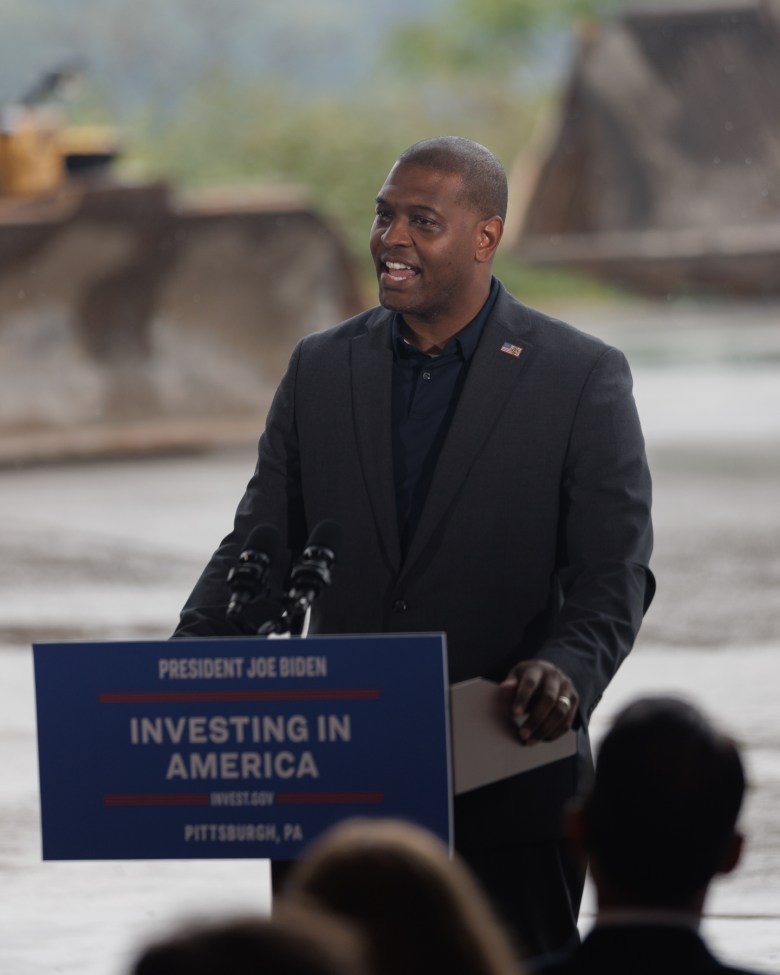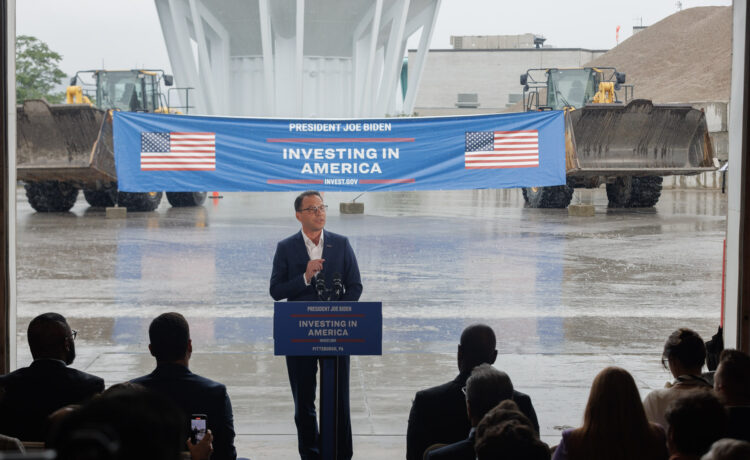Tucked behind mounds of gravel and stone at Castle Builders Supply and Trucking along the shore of Neville Island on Monday, Gov. Josh Shapiro joined Environmental Protection Agency Administrator Michael Regan to announce a national rollout of $4.3 billion in federal funding intended to accelerate America’s energy transition and reduce climate pollution.
Pennsylvania will receive $396 million to cut industrial carbon emissions, which are by far the largest source of greenhouse gas emissions in the state. The award is the second largest federal investment in the state’s history.
“We are going to create jobs and economic opportunity. We are going to lower operating costs for Pennsylvania businesses, and we are going to reduce pollution in our air and water,” Shapiro said. “This is a win-win across the board.”
The governor explained a vision for Pennsylvania: Steel smelters that once burned coal now powered by electricity. Union workers building energy-efficient geothermal heating and cooling systems and lowering costs for consumers. Technology that captures carbon from factories and injects it deep underground, “where it can’t make our air worse,” he said.
He said he sees a Pennsylvania that grapples with its legacy of pollution and one that puts people to work in union jobs that work toward a new chapter of clean energy.
The funding will be used to form the RISE PA program, and the Pennsylvania Department of Environmental Protection [DEP] will soon issue grants statewide to manufacturing companies seeking to reduce carbon emissions. Notably, the program will not apply to transportation or electricity generation.
The grants, Shapiro said, can be used for a wide array of projects, including to improve energy efficiency, directly reduce emissions, replace carbon-emitting equipment with electric-powered alternatives or implement carbon capture technology.
The award drew praise from local labor leaders who appeared alongside Shapiro — whose national profile has risen as he’s discussed as a potential vice-presidential nominee — and Regan of the Environmental Protection Agency [EPA].
“Pollution can no longer be our legacy.” said Darrin Kelly, president of the Allegheny/Fayette Central Labor Council. “This guarantees it.”

As a region, Southwestern Pennsylvania also applied to the EPA for funding through the Southwestern Pennsylvania Commission. That proposal was not one of the 25 selected to receive funds through the Inflation Reduction Act on Monday.
Allegheny County Executive Sarah Innamorato said the county is still pursuing funding for a number of the projects included in the commission’s proposal, including some concerning housing infrastructure. She noted that the administration will look to alternative funding streams within EPA or the federal Department of Housing and Urban Development as well as maintaining communication with the governor’s office about other funding options for those projects within Allegheny County.
To reduce industrial pollution in Allegheny County, Innamorato said the Health Department needs to go beyond exploring increased fees for polluters and look to incentives for polluting industries to cut emissions.
“We also want carrots,” she said. “We want incentives to get businesses to do the right thing and to invest in their science, in their campuses, in the technology so that they can reduce emissions.
“I see us working with industry that I think has defined our region for a long time,” Innamorato continued. “But really give them a boost and get them to the table to talk about how they are going to modernize their facility, how they are going to come up with good community benefit agreements in their host communities, how they’re going to put more safeguards and technology in place.”
Innamorato pointed to U.S. Steel, the region’s largest polluter, as the administration’s “main target,” and also local manufacturers like ATI, an Allegheny Valley steelmaker, and concrete manufacturer Lindy Paving as local examples of carbon-intensive industry. “We want you to have the latest and greatest technology that protects health, safety and well-being.”
DEP Acting Director Jess Shirley said the agency plans to announce a formal application process in the coming days, and the grants will be managed by the agency’s Energy Programs Office. That office’s Director David Althoff said he expects the funds to flow beginning early next year in what will likely be a “multi-month process” of formalizing the application process and executing agreements.
Innamorato said Southwestern Pennsylvania is “one of the most climate-resilient regions in America,” adding that the area could be accepting climate refugees from coastal areas and places like the southwest United states that are “too hot for people to survive.”
“We want people to move here,” she said, “but we want people to move here and have good air to breathe and not have to suffer through a number of poor air quality days and face adverse health impacts.”
Quinn Glabicki is the environment and climate reporter at PublicSource and a Report for America corps member. He can be reached at [email protected] and on Instagram and X @quinnglabicki.














